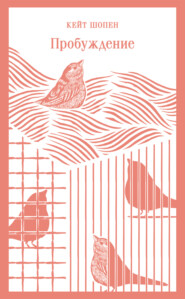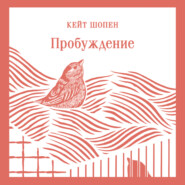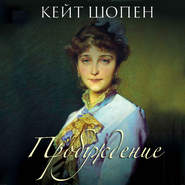По всем вопросам обращайтесь на: info@litportal.ru
(©) 2003-2025.
✖
The Awakening
Настройки чтения
Размер шрифта
Высота строк
Поля
The sun was high up and beginning to bite. The swift breeze seemed to Edna to bury the sting of it into the pores of her face and hands. Robert held his umbrella over her.
As they went cutting sidewise through the water, the sails bellied taut, with the wind filing and overflowing them. Old Monsieur Farival laughed sardonically at something as he looked at the sails, and Beaudelet swore at the old man under his breath.
Sailing across the bay to the Chênière Caminada, Edna felt as if she were being borne away from some anchorage which had held her fast, whose chains had been loosening—had snapped the night before when the mystic spirit was abroad, leaving her free to drift whithersoever she chose to set her sails. Robert spoke to her incessantly; he no longer noticed Mariequita. The girl had shrimps in her bamboo basket. They were covered with Spanish moss. She beat the moss down impatiently, and muttered to herself sullenly.
“Let us go to Grande Terre tomorrow?” said Robert in a low voice.
“What shall we do there?”
“Climb up the hill to the old fort and look at the little wriggling gold snakes, and watch the lizards sun themselves.”
She gazed away toward Grande Terre and thought she would like to be alone there with Robert, in the sun, listening to the ocean’s roar and watching the slimy lizards writhe in and out among the ruins of the old fort.
“And the next day or the next we can sail to the Bayou Brulow,” he went on.
“What shall we do there?”
“Anything—cast bait for fish.”
“No; we’ll go back to Grande Terre. Let the fish alone.”
“We’ll go wherever you like,” he said. “I’ll have Tonie come over and help me patch and trim my boat. We shall not need Beaudelet nor any one. Are you afraid of the pirogue?”
“Oh, no.”
“Then I’ll take you some night in the pirogue when the moon shines. Maybe your Gulf spirit will whisper to you in which of these islands the treasures are hidden—direct you to the very spot, perhaps.”
“And in a day we should be rich!” she laughed. “I’d give it all to you, the pirate gold and every bit of treasure we could dig up. I think you would know how to spend it. Pirate gold isn’t a thing to be hoarded or utilized. It is something to squander and throw to the four winds, for the fun of seeing the golden specks fly.”
“We’d share it, and scatter it together,” he said. His face flushed.
They all went together up to the quaint little Gothic church of Our Lady of Lourdes, gleaming all brown and yellow with paint in the sun’s glare.
Only Beaudelet remained behind, tinkering at his boat, and Mariequita walked away with her basket of shrimps, casting a look of childish ill-humor and reproach at Robert from the corner of her eye.
CHAPTER 13 (#ulink_1a34888d-9f54-5c45-9a14-55476c007ced)
A feeling of oppression and drowsiness overcame Edna during the service. Her head began to ache, and the lights on the altar swayed before her eyes. Another time she might have made an effort to regain her composure; but her one thought was to quit the stifling atmosphere of church and reach the open air. She arose, climbing over Robert’s feet with a muttered apology. Old Monsieur Farival, flurried, curious, stood up, but upon seeing that Robert had followed Mrs. Pontellier, he sank back into his seat. He whispered an anxious inquiry of the lady in black, who did not notice him or reply, but kept her eyes fastened upon the pages of her velvet prayer-book.
“I felt giddy and almost overcome,” Edna said, lifting her hands instinctively to her head and pushing her straw hat up from her forehead. “I couldn’t have stayed through the service.” They were outside in the shadow of the church. Robert was full of solicitude.
“It was folly to have thought of going in the first place, let alone staying. Come over to Madame Antoine’s; you can rest there.” He took her arm and led her away, looking anxiously and continuously down into her face.
How still it was, with only the voice of the sea whispering through the reeds that grew in the salt-water pools! The long line of little gray, weather-beaten houses nestled peacefully among the orange trees. It must always have been God’s day on that low, drowsy island, Edna thought. They stopped, leaning over a jagged fence made of sea drift, to ask for water. A youth, a mild-faced Acadian, was drawing water from the cistern, which was nothing more than a rusty buoy, with an opening on one side, sunk in the ground. The water which the youth handed to them in a tin pail was not cold to taste, but it was cool to her heated face, and it greatly revived and refreshed her.
Madame Antoine’s cot was at the far end of the village. She welcomed them with all the native hospitality, as she would have opened her door to let the sunlight in. She was fat, and walked heavily and clumsily across the floor. She could speak no English, but when Robert made her understand that the lady who accompanied him was ill and desired to rest, she was all eagerness to make Edna feel at home and to dispose of her comfortably.
The whole place was immaculately clean, and the big, four-posted bed, snow-white, invited one to repose. It stood in a small side room which looked out across a narrow grass plot toward the shed, where there was a disabled boat lying keel upward.
Madame Antoine had not gone to mass. Her son Tonie had, but she supposed he would soon be back, and she invited Robert to be seated and wait for him. But he went and sat outside the door and smoked. Madame Antoine busied herself in the large front room preparing dinner. She was boiling mullets over a few red coals in the huge fireplace.
Edna, left alone in the little side room, loosened her clothes, removing the greater part of them. She bathed her face, her neck and arms in the basin that stood between the windows. She took off her shoes and stockings and stretched herself in the very center of the high, white bed. How luxurious it felt to rest thus in a strange, quaint bed, with its sweet country odor of laurel lingering about the sheets and mattress! She stretched her strong limbs that ached a little. She ran her fingers through her loosened hair for a while. She looked at her round arms as she held them straight up and rubbed them one after the other, observing closely, as if it were something she saw for the first time, the fine, firm quality and texture of her flesh. She clasped her hands easily above her head, and it was thus she fell asleep.
She slept lightly at first, half awake and drowsily attentive to the things about her. She could hear Madame Antoine’s heavy, scraping tread as she walked back and forth on the sanded floor. Some chickens were clucking outside the windows, scratching for bits of gravel in the grass. Later she half heard the voices of Robert and Tonie talking under the shed. She did not stir. Even her eyelids rested numb and heavily over her sleepy eyes. The voices went on—Tonie’s slow, Acadian drawl, Robert’s quick, soft, smooth French. She understood French imperfectly unless directly addressed, and the voices were only part of the other drowsy, muffled sounds lulling her senses.
When Edna awoke it was with the conviction that she had slept long and soundly. The voices were hushed under the shed. Madame Antoine’s step was no longer to be heard in the adjoining room. Even the chickens had gone elsewhere to scratch and cluck. The mosquito bar was drawn over her; the old woman had come in while she slept and let down the bar. Edna arose quietly from the bed, and looking between the curtains of the window, she saw by the slanting rays of the sun that the afternoon was far advanced. Robert was out there under the shed, reclining in the shade against the sloping keel of the overturned boat. He was reading from a book. Tonie was no longer with him. She wondered what had become of the rest of the party. She peeped out at him two or three times as she stood washing herself in the little basin between the windows.
Вы ознакомились с фрагментом книги.
Приобретайте полный текст книги у нашего партнера:
Приобретайте полный текст книги у нашего партнера:









